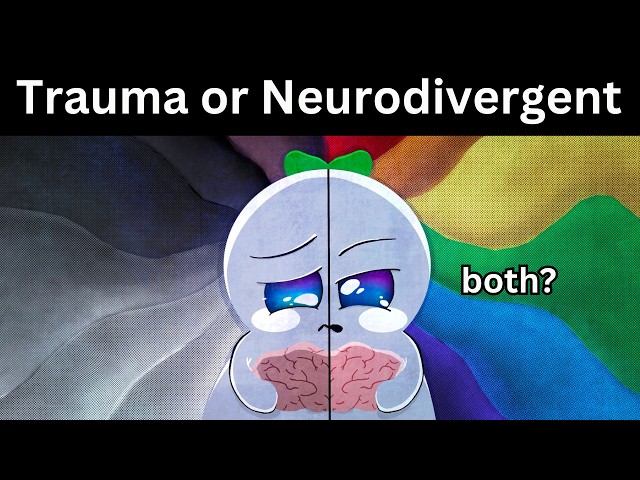Are You Always Zoning Out in Class? Forgetting appointments or snapping over small things, and you wonder, “Is there something wrong with me? Why do I feel different from everyone else?” Trauma and neurodivergence can look surprisingly similar. You might be dealing with one or both, and from the outside, it’s not always easy to tell the difference.
What Is Neurodivergence and How Does It Show Up?
Neurodivergence refers to natural differences in how brains work, like ADHD, autism, and dyslexia. These are not flaws—they’re just different ways of thinking, feeling, and processing the world. If you’re neurodivergent, you might struggle with focus, but not because you’re lazy. Maybe your brain constantly jumps between thoughts, or maybe it hyperfocuses so deeply that you lose track of time. You might have trouble organizing your space, managing time, or calming your emotions because your brain doesn’t work the way most systems expect it to. You may also be really sensitive to sound, light, textures, or even other people’s emotions. And you’ve probably felt different for as long as you can remember, even if no one ever explained why.
What Is Trauma and How Does It Show Up?
Trauma is something really painful or upsetting that happens to you, and it affects how you feel, think, or behave. It can come from a single event, like an accident or loss, or from ongoing experiences, like abuse or emotional neglect. Have you ever been overwhelmed by something that didn’t seem to bother anyone else, or felt numb, zoned out, or tense for no clear reason? That might be trauma. And no, it doesn’t always come from one big traumatic event. Sometimes trauma builds over time through years of stress, pressure, or not feeling safe just being yourself.
A trauma-impacted brain is often stuck in survival mode. You might shut down, dissociate, or get stuck in loops of fear or frustration. You might forget things, not because you’re careless, but because your brain is protecting you from overload. Even trusting people can feel risky, even when you want connection. Your body might not let you relax into it.
Why It’s Easy to Confuse the Two
If you’ve ever asked, “Is this trauma, or just how my brain works?” you’re not alone. Both trauma and neurodivergence can cause things like emotional overwhelm, impulsivity, memory issues, low self-esteem, and difficulty in work, school, or relationships. They both shape how we handle stress and interpret the world. Sometimes trauma can look like neurodivergence; other times, they coexist, especially if you grew up misunderstood, unsupported, or constantly told to “just be normal.”
A neurodivergent kid who’s told to stop being “weird” might end up masking so hard their real self gets buried under years of survival strategies. And someone shaped by trauma might later discover they were neurodivergent all along. Sometimes, being neurodivergent is traumatic. Living in a world that doesn’t accommodate your brain—where you always have to explain or overexplain, apologize, or hide your differences—can take a real toll.
What Do You Do With This?
If you’ve ever felt broken or confusing, even to yourself, please know this: you don’t need to have all the answers to deserve support, and you don’t have to prove your pain to be taken seriously. Whether your nervous system is wired differently, shaped by trauma, or both, you deserve care that meets you where you are.
If you’re supporting someone else, lead with curiosity and compassion. Behavior is communication, and what looks like defiance or laziness is often someone doing their best with the tools they have.
You Are Not Alone
If this articlere sonated with you, take a breath. You’re not too much, you’re not imagining it, and you’re not the only one trying to make sense of your own world. Healing takes time, but understanding yourself—even a little more than you did yesterday—is already a powerful step forward. So, good job!







Leave a Comment